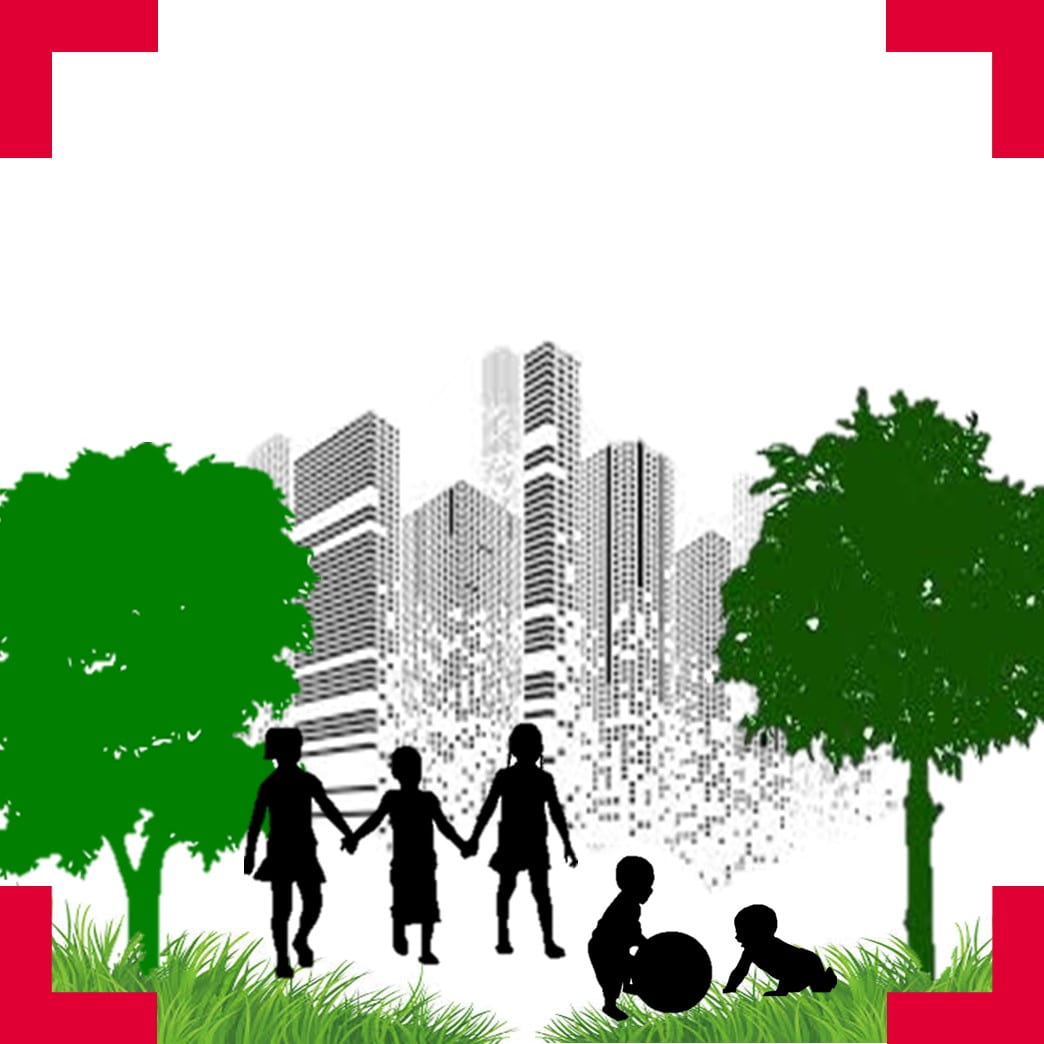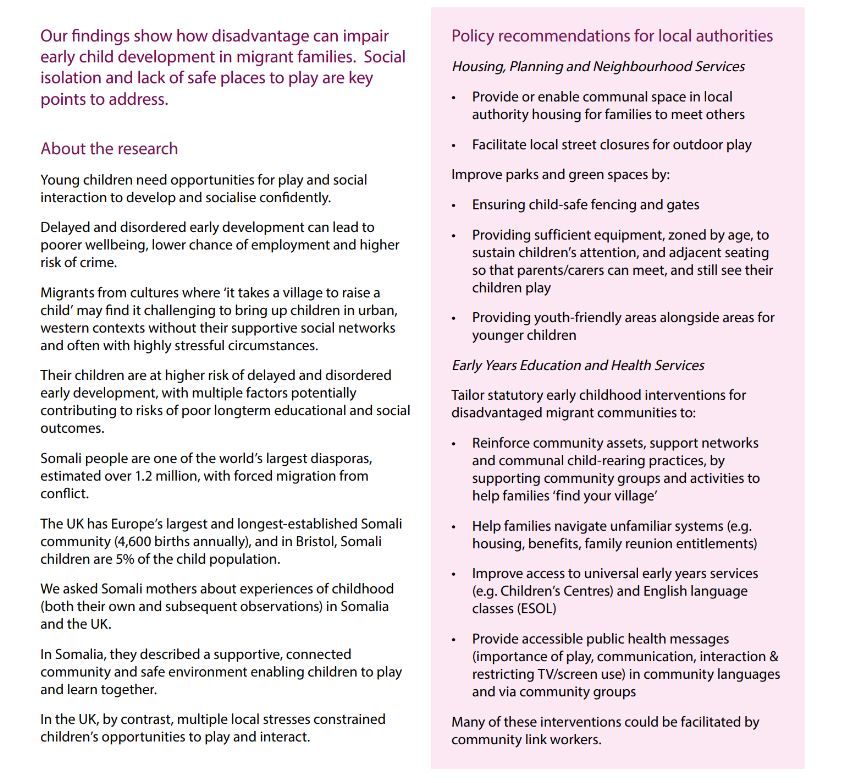Find your Village: feasibility work on refugee resilience narratives with Bristol Somali Community
What are Bristol Somali refugees’ experiences of journeys from adversity to resilience, from isolation to connectedness, and from constraining to facilitating environments? How might video narratives contribute to understanding and action to improve the opportunities for pre-school children in refugee families?

The experiences babies, toddlers and young children have affect how their brains grow and how they learn. Children who live in difficult situations are more likely to be slow to speak or learn, and to develop learning difficulties or conditions such as autism, especially if the family is poor. They may grow up to have difficult lives, and need costly services to support them. Refugee families may experience specific challenges which affect wellbeing and limit children’s developmental opportunities.
Many people from Somalia have moved to the UK because of war. In Bristol 5% of children are now Somali. Somali children in Bristol do less well at school than children from other backgrounds. They are also more likely to see doctors because of problems with their talking, learning and behaviour, with 6x the rate of referral for possible autism.
The community people live in affects how happy and safe children and families feel, and how connected or isolated they become. Somali mothers in Bristol have expressed concerns over limited resources, multiple competing demands, social isolation, negative features of housing and local built environment, and perceptions of risk that may limit children’s opportunities for early play and social experiences. For families coming from societies where child-rearing is communal or collective, it may be especially important to consider what helps build a sense of community, social connectedness or isolation, where they now live.
What did the project involve?
Prior to this project, the team had designed a peer-support volunteer intervention ‘Find your village’ which brings together the best of Somali/African and European/Western ways of bringing up children, providing group activities each week; engaging, enabling and advocating for families’ strengths and needs, and supporting activities to improve the neighbourhood environment, working with local organisations. This aimed to improve parents’ confidence and children’s experience, and improve access to local agencies.
They also held an innovative ‘Walkabout’ around Barton Hill, for families, practitioners and academics to critique their local physical and social environment, supported by the Brigstow Institute, leading to a Photoexhibition and discussion.
To feel confident that their interventions will engage families experiencing distress, isolation and adverse environments, who may most stand to benefit, this this project was centred on feasibility work with the local Somali community. It was based on the following initial research questions:
- What are Bristol Somali refugees’ experiences of journeys from adversity to resilience, from isolation to connectedness, and from constraining to facilitating environments?
- How might video narratives contribute to understanding and action to improve the opportunities for pre-school children in refugee families?
This project involved a public consultation with members of the Somali community to explore what potential they would see for this approach, how it might best be undertaken, and any concerns they might have that would be important to take into account.
The team piloted a novel approach to social network analysis, to understand more about social connectedness within this community.
They piloted the film making of participants’ narratives, working towards two products:
1) a small collection of 5 x 30-60second clips
2) a short film 3-4mins.
The project envisaged that these would have multiple uses, e.g. engagement of future participants in interventions; advocacy with statutory authorities and commissioners; presentation to researchers and funders; as an online resource for migrant communities to benefit from and add their own narratives to.
The project explored options to collate these videos into an online resource for the Somali diaspora to support child-rearing, community development and advocacy for environmental change.
The team incorporated these findings into Intervention Design and Refugee Resilience papers to submit for publication.
Who are the team and what do they bring?
- Tom Allport (Bristol Medical School) is a researcher and paediatrician who works on understanding ways to improve children and young people’s development and participation despite the challenges of disabling situations.
- Tom Sperlinger (English, University of Bristol) is a researcher of literature and engaged pedagogy. His work focuses on a combination of lifelong learning, literary study, and civic engagement.
- Vanessa Er (Bristol Medical School) is a researcher focused on public health with an interest in applying visual methods in engaging community on the relationship of built and social environment with health.
- Sarah Brodbin (Atgo Productions) worked for 10 years as a current affairs producer and director at the BBC and C4, before starting up her own film business providing content to companies and charities. She also worked as the Raising Voices Officer on UK Poverty for Oxfam.
- Mora McLagan (Atgo Productions) is a Communications Consultant and former journalist now working in the charity sector. Having previously studied Social Anthropology and practiced participatory research, she is interested using digital story-telling to empower individuals to improve their communities and transform lives around them.
- Lamine Mahdjoubi (Built Environment, UWE) is a researcher with an interest in the design of outdoor environments for children’s health and well-being.
- Abdullahi Farah (Bristol Somali Resource Centre) is an activist and community figure with extensive experience of involvement in and support for effective public consultation processes.
What were the results?
You can read more about the project at Bristol 24/7 or watch the video below:
In March 2020, the project developed the Policy Briefing: ‘Improving outcomes for young children in refugee families: lessons from Somali parents’ experience of play and social interaction opportunities in the UK‘. Below is a small excerpt:
 The team co-wrote the paper: ‘Like a life in a cage’: Understanding child play and social interaction in Somali refugee families in the UK‘.
The team co-wrote the paper: ‘Like a life in a cage’: Understanding child play and social interaction in Somali refugee families in the UK‘.

